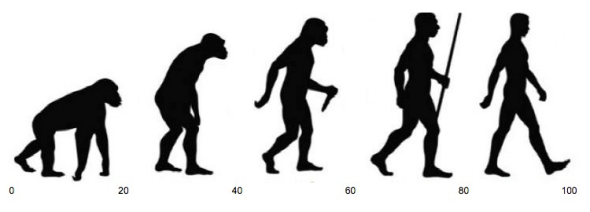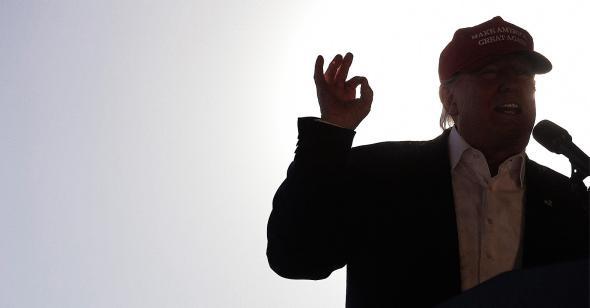Donald Trump has been charged with racism throughout much of his career and much of his campaign. As researchers who investigate racial attitudes and their relationship to politics, we have been investigating the idea that there are whites in the U.S. who believe that black people are not as evolved as white people. In other words, the dehumanization of blacks. As we watched the rise of Trump, we wondered if the people who held this belief were also more likely to support the Republican nominee.
Our research indicates that many whites see blacks as less human than they see members of their own racial group. More than one-third of whites we surveyed rate black people as “less evolved” than they rate whites. Furthermore, substantial proportions of white respondents say that the terms “savage,” “barbaric,” and “lacking self-restraint, like animals” describe black people well. Those who hold these dehumanizing views of black people are disproportionately likely to support Donald Trump.
This idea—which to be clear is absolutely false—was once erroneously supported by science. It was not all that long ago that leading researchers claimed that black people were less evolved than white people and closer to humanity’s apelike ancestors on the evolutionary scale. We suspected, however, that more people still possess some of these beliefs than is generally thought. To assess the extent to which the general public subscribes to these claims in the present day, two of us (Jardina and Piston) conducted a survey of a nationally representative sample of 2,000 non-Hispanic white U.S. adult citizens. The survey (which employed a method developed by Kellogg School of Management professor Nour Kteily and colleagues) was administered over the internet and contracted through the firm GfK, whose address-based sampling approach is the gold standard in online survey research.*
Subjects viewed a graphical depiction of “The Ascent of Man,” in which various silhouettes along a scale reflect popular perceptions of the evolution of humans from ape to fully upright man. The graph begins on the left end of the scale with a crouching ancestor reminiscent of an ape, moves in the middle of the scale to a Cro-Magnon type holding a spear, and concludes on the right end of the scale with a fully upright modern human. Next, subjects were asked how evolved they believe blacks and whites to be on this 0-100 scale.

Used with permission of the authors
In this nationally representative sample, a full 38 percent of white subjects rated blacks as less evolved than they rated whites.
Because this finding was so surprising, we conducted a separate survey on Mechanical Turk in which we asked the identical “Ascent of Man” question to our subjects and then, immediately afterward, asked them what they had been thinking about when deciding how to respond to this question. White respondents routinely described black people in dehumanizing ways. Some examples: “I consider blacks to be closer to the animal kingdom,” one respondent said, because blacks “lack the intelligence and morals” of other races. Another said that black people “carry and conduct themselves” in ways that are “almost animalistic.” A third responded claimed that black people have “the highest rate of murders” and cited this as evidence for the assertion that blacks are “people who act like animals.”
These results are not limited to groups of whites that are often stereotyped as racially prejudiced. For instance, 33 percent of white Democrats and 34 percent of high-income whites rated black people as less evolved than white people, compared with 39 percent of white Republicans and 41 percent of low-income whites. Dehumanizing views are pervasive across white social groups.
That said, there is one group of whites that stands out in the degree to which it holds dehumanizing views of black people: Trump supporters. To measure evaluations of Trump, we asked our subjects to describe how warm they feel toward Trump on a 0-100 scale. Here we compare Trump’s strongest opponents (defined here as those who rate Trump at a 25 or below) to Trump’s strongest supporters (those who rate Trump higher than 75). Twenty-eight percent of white Trump opponents rate blacks as less evolved than they rate whites. In contrast, a majority of Trump supporters—52 percent—rate blacks as less evolved than whites.
We detected substantial levels of dehumanization among Trump supporters through additional survey questions as well. For example, 27 percent of Trump supporters said the phrase “lacking self-restraint, like animals” describes black people well, compared with 8 percent of Trump opponents. Trump supporters were also substantially more likely than Trump opponents to say that the terms “savage” and “barbaric” describe black people well.
Of course, these findings are not the first to reveal connections between racial attitudes and support for Trump. But previous surveys have measured more subtle (though still important) forms of prejudice, such as negative stereotypes about black people or resentment toward black people. Our work captures something more fundamental: the denial that blacks fully count as people in the first place.
Critically, surveys we conducted earlier in the Republican primary reveal that dehumanization of blacks is not strongly associated with support for other Republican candidates such as Sens. Ted Cruz and Marco Rubio. Of course, Trump’s rhetoric on racial issues is much different from that of the other Republican candidates in the field. Trump has also been slow to distance himself from white supremacists such as David Duke of the Ku Klux Klan. He has tweeted and retweeted memes from white supremacist Twitter accounts as well and repeated the falsehood that most white homicide victims are killed by black people. Trump has praised violence against black protesters at his rallies and even suggested that he might participate in it himself. It is no surprise, then, that whites who see black people as less than fully human are disproportionately likely to support Trump.
Many political pundits appear bewildered that a candidate as overtly racist as Trump could have so much success on the presidential campaign trail. But for those whites who deny the full humanity of blacks, Trump may be popular not despite his racism but because of it.
*Correction, Nov. 11, 2016: This article originally misidentified Nour Kteily as a professor at Northwestern. He is part of the Kellogg School of Management. (Return.)
